Vietnamese property tycoon Truong My Lan is in a desperate race against time. On Tuesday, the 68-year-old will learn the verdict of her appeal against a death sentence she received in April for orchestrating one of the world’s largest bank frauds.
The ruling was both rare and shocking, as she is among the very few women in Vietnam to receive a death sentence for a white-collar crime. However, the law in Vietnam stipulates that if she repays 75% of the funds she misappropriated, her sentence may be reduced to life imprisonment.
In April, a court found that Truong My Lan had secretly controlled the Saigon Commercial Bank, the fifth-largest lender in Vietnam, and siphoned off loans and cash over a decade through a network of shell companies, totaling approximately $44 billion (£34.5 billion). Prosecutors asserted that $27 billion was misappropriated, and $12 billion was deemed embezzled, leading to her death sentence.
To stave off execution, Truong My Lan needs to raise $9 billion. During her trial, she displayed moments of defiance but has taken a more contrite stance in recent appeal hearings. She expressed embarrassment over being a burden to the state and stated her primary focus is on repaying what she owes.
Born into a Sino-Vietnamese family in Ho Chi Minh City, Truong My Lan began her career selling cosmetics alongside her mother at a market stall. With the introduction of economic reforms by the Communist Party in 1986, she ventured into real estate, eventually building a substantial portfolio of hotels and restaurants. Prior to her conviction, she was the chairwoman of the Van Thinh Phat Group, a prominent real estate firm.
Her conviction was a pivotal moment in the “Blazing Furnaces” anti-corruption campaign led by then-Communist Party Secretary-General Nguyen Phu Trong. Of the 86 defendants in the case, all were convicted, with four receiving life sentences, while the others faced prison terms ranging from three years to 20 years. Her husband and niece were also sentenced to lengthy jail terms.
The State Bank of Vietnam has reportedly spent billions to recapitalize Saigon Commercial Bank to prevent a broader banking crisis. Prosecutors have argued that her crimes were historically significant and did not merit leniency.
Truong My Lan’s legal team is rapidly working to secure the $9 billion needed for her potential reprieve, but liquidating her assets presents challenges. Some of her assets are luxury properties in Ho Chi Minh City that could be sold quickly, while others involve stakes in various business ventures.
Authorities have identified over a thousand assets connected to the fraud that remain frozen. Her legal team has indicated that she is reaching out to friends for loans to help meet the target. They are also advocating for leniency, arguing that while under a death sentence, it will be difficult for her to negotiate favorable prices for her assets. They contend that her prospects improve significantly if her sentence is commuted to life instead.
“The total value of her holdings actually exceeds the required compensation amount,” lawyer Nguyen Huy Thiep stated. “However, many of the assets are real estate, which takes time to liquidate. Truong My Lan hopes the court will create the most favorable conditions for her to continue making compensation.”
Few expect the judges will be swayed by these arguments. Should they reject her appeal, she will effectively be in a race against time to gather the funds needed to avoid execution.
Vietnam considers the death penalty a state secret and does not disclose the number of individuals on death row, though human rights organizations assert there are over 1,000, making Vietnam one of the world’s leading executors. Execution sentences typically involve lengthy delays, but prisoners receive little warning before execution is carried out.
If Truong My Lan can recover the $9 billion before her sentence is enforced, her life may be spared.
Credit: BBC News




